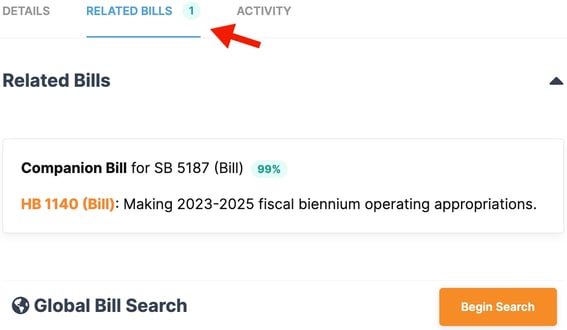What are Related Bills?
Leverage Plural's AI engine to quickly and easily identify relationships between bills that share similar text.
What do we mean by "Related Bills"?
Plural's Related Bill recommendations are based on the degree of text similarity between specific versions of different bills. For example, when a user is reading bill X and Plural recommends bill Y and notes that it has 82% text similarity, it means that the versions of those two bills share 82% of the same sentences.
Plural calculates text similarity at a sentence level. First, it removes from its analysis any "boilerplate" language that is used in most bills. It then breaks down each version of a bill into its component sentences and compares them to versions of other bills. When versions of two bills are found to share at least 65% of the same substantive sentences, Plural identifies them as related.
Slight differences in formatting and wording will prevent any two bill versions from having 100% text similarity.
Are you able to identify the type of relationship between two related bills?
Once Plural finds bills that are related, it attempts to label the specific relationship between those two bills. Plural's intelligence engine does so by utilizing machine learning methods and historical legislative data from past sessions.
Currently, Plural is labeling the following kinds of relationships:
- Companion Bills
- Companion bills are similar or identical legislation that are introduced in the upper and lower chambers of a legislature during the same session.
- Re-Introduced Bills
- Bills that do not make it through the legislative process by the end of a session are often re-introduced in a later session.
- Omnibus Bills
- Omnibus bills consolidate various other bills -- that often span a number of issues -- into a single package. Plural identifies when a smaller bill has been pulled into a larger omnibus bill and will display that relationship on both bill pages.
How can I find bills that are related to the one I'm viewing?
Related bills are displayed in the "RELATED BILLS" tab of a Bill Detail page.


We are continuing to refine our recommendations and push them to be more accurate and useful. Understanding how helpful these recommendations are for you is an integral part of that process. If you have any feedback or questions, please let us know at support@pluralpolicy.com
